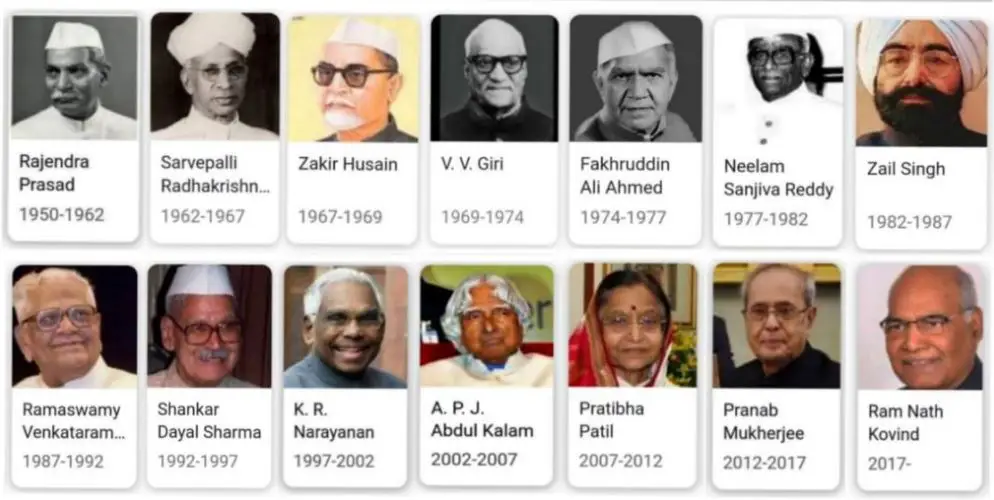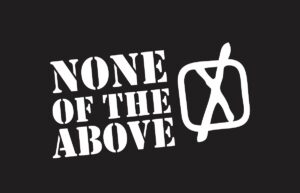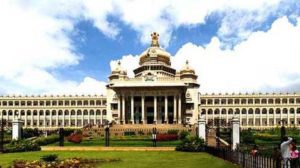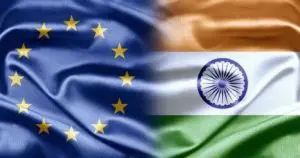Table of Contents
President’s – Powers and Functions | UPSC – IAS
The President of India, is the ceremonial head of state of India and the commander-in-chief of the Indian Armed Forces. The primary duty of the president is to preserve, protect and defend the constitution and the law of India as made part of his oath (Article 60 of Indian constitution). The president is the common head of all independent constitutional entities. He is the first citizen of India and acts as the symbol of:-
- Unity
- Integrity and
- Solidarity of the nation.
Powers and Functions of the Indian President
Constitutional position of president of India is similar to the position as the King under the English Constitution.
- He is the head of the state but not of the Executive.
- He represents the Nation but does not rule the Nation.
- He is the symbol of the Nation.
- His place in the administration is that of a ceremonial device on a seal by which the nation’s decisions are made known.
Executive Powers of Indian President | UPSC – IAS
The president is responsible for making a wide variety of appointments. These include:-
- The chief justice and other judges of the Supreme Court of India and state/union territory high courts.
- The Chief Minister of the National Capital Territory of Delhi.
- The Comptroller and Auditor General.(CAG)
- The Chief Election Commissioner and other Election Commissioners.
- The chairman and other Members of the Union Public Service Commission.
- The Attorney General.
- Governors of states are also appointed by the president
- Ambassadors and High Commissioners to other countries (only through the list of names given by the prime minister).
- Officers of the All India Services (IAS, IPS and IFoS), and other Central Civil Services in Group ‘A’.
The executive powers and functions of the President are as follows:-
- All executive actions of the Government of India are formally taken in his name.
- He can make rules specifying the manner in which the orders and other instruments made and executed in his name shall be authenticated.
- President can make the rules for more convenient transaction of business of the state government.
- He can make rules for more convenient transaction of business of the Union government, and for allocation of the said business among the ministers.
- He can seek any information relating to the administration of affairs of the Union, and proposals for legislation from the prime minister.
- He can require the Prime Minister to submit, for consideration of the council of ministers, any matter on which a decision has been taken by a minister but, which has not been considered by the council.
- He directly administers the union territories through administrators appointed by him.
- He can declare any area as scheduled area and has powers with respect to the administration of scheduled areas and tribal areas.
Legislative Powers of Indian President | UPSC – IAS
The President is an integral part of the Parliament of India, and enjoys the following legislative powers.
- The president inaugurates parliament by addressing it after the general elections and also at the beginning of the first session every year per Article 87(1). The presidential address on these occasions is generally meant to outline the new policies of the government
- All bills passed by the parliament can become laws only after receiving the assent of the president per Article 111.
- He can summon or prorogue the Parliament and dissolve the Lok – Sabha.
- He can also summon a joint sitting of both the Houses of Parliament, which is presided over by the Speaker of the Lok – Sabha.
- He can send messages to the Houses of Parliament, whether with respect to a bill pending in the Parliament or otherwise.
- He can appoint any member of the Lok – Sabha to preside over its proceedings when the offices of both the Speaker and the Deputy Speaker fall vacant. Similarly, he can also appoint any member of the Rajya Sabha to preside over its proceedings when the offices of both the Chairman and the Deputy Chairman fall vacant.
- He nominates 12 members of the Rajya Sabha from amongst persons having special knowledge or practical experience in literature, science, art and social service.
- He can nominate two members to the Lok Sabha from the Anglo-Indian Community.
- He decides on questions as to disqualifications of members of the Parliament, in consultation with the Election Commission.
- His prior recommendation or permission is needed to introduce certain types of bills in the Parliament. For example,
- A bill involving expenditure from the Consolidated Fund of India, or
- A bill for the alteration of boundaries of states or creation of a new state.
However, if the bill is passed again by the Parliament, with or without amendments, the President has to give his assent to the bill.
- He can promulgate ordinances when the Parliament is not in session. These ordinances must be approved by the Parliament within six weeks from its reassembly. He can also withdraw an ordinance at any time.
- He can make regulations for the peace, progress and good government of the Andaman and Nicobar Islands, Lakshadweep, Dadra and Nagar Haveli and Daman and Diu. In the case of Puducherry also, the President can legislate by making regulations but only when the assembly is suspended or dissolved.
Financial Powers of Indian president | UPSC – IAS
The financial powers and functions of the President are:
- Money bills can be introduced in the Parliament only with his prior recommendation.
- President lays the Annual Financial Statement, i.e. the Union budget, before the parliament.
- President demand for a grant can be made except on his recommendation.
- President can make advances out of the contingency fund of India to meet any unforeseen expenses.
- President constitutes a finance commission after every five years to recommend the distribution of revenues between the Centre and the states.
Judicial Powers of Indian president | UPSC – IAS
The primary duty of the president is to preserve, protect and defend the constitution and the law of India per Article 60.
- He appoints the Chief Justice and the judges of Supreme Court and high courts.
- He can seek advice from the Supreme Court on any question of law or fact. However, the advice tendered by the Supreme Court is not binding on the President.
- The Indian government’s chief legal adviser, Attorney General of India, is appointed by the president of India under Article 76(1) and holds office during the pleasure of the president.
Pardoning powers of President of India | UPSC – IAS
He can grant pardon, reprieve, respite and remission of punishment, or suspend, remit or commute the sentence of any person convicted of any offence: In all cases where the punishment or sentence is –
- By a court martial;
- For an offence against a Union law;
- or a sentence of death.
Note:- Power of pardon shall be exercised by the President on the advice of Council of Ministers. So pardoning power of president is not discretionary in nature.
Discretionary power of president | UPSC – IAS
Though the President has no constitutional discretion, he has some situational discretion. In other words, the President can act on his discretion (that is, without the advice of the ministers) under the following situations:
- Appointment of Prime Minister when no party has a clear majority in the Lok Sabha or when the Prime Minister in office dies suddenly and there is no obvious successor.
- Dismissal of the council of ministers when it cannot prove the confidence of the Lok Sabha.
- Dissolution of the Lok Sabha if the council of ministers has lost its majority.
Diplomatic Powers of Indian President | UPSC – IAS
- All international treaties and agreements are negotiated and concluded on behalf of the President.
- However, they are subject to the approval of the Parliament. In practice, such negotiations are usually carried out by the prime minister along with his Cabinet (especially the Foreign Minister).
- President represents India in international forums and affairs and sends and receives diplomats like ambassadors, high commissioners, and so on.
Military Powers of Indian president | UPSC – IAS
- He is the supreme commander of the defence forces of India. In that capacity, he appoints the chiefs of the Army, the Navy and the Air Force.
- President can declare war or conclude peace, subject to the approval of the Parliament.
- All important treaties and contracts are made in the president’s name.
Emergency Powers of Indian president | UPSC – IAS
The president can declare three types of emergencies:-
- National Emergency (Article 352)
- A national emergency can be declared in the whole of India or a part of its territory for causes of war or armed rebellion or an external aggression.
- Such an emergency was declared in India in 1962 (Indo-China war), 1971 (Indo-Pakistan war), and 1975 to 1977 (declared by Indira Gandhi).
- President’s Rule (Article 356 & 365) –
- If the president is not fully satisfied, on the basis of the report of the governor of the concerned state or from other sources that the governance in a state cannot be carried out according to the provisions in the constitution, he can proclaim under Article 356 a state of emergency in the state. Such an emergency must be approved by the parliament within a period of 2 months.
- Financial Emergency (Article 360)
- Under article 360 of the constitution, the president can proclaim a financial emergency when the financial stability or credit of the nation or of any part of its territory is threatened
- The president can reduce the salaries of all government officials, including judges of the supreme court and high courts, in cases of a financial emergency
Veto Power of the Indian President | UPSC – IAS
A bill passed by the Parliament can become an act only if it receives the assent of the President. Since the Indian constitution does not provide any time limit within which the president is to declare his assent or refusal, the president could exercise a “pocket veto” by not taking any action for an indefinite time.
The object of conferring this power on the President is two-fold:-
- To prevent hasty and ill-considered legislation by the Parliament; and
- To prevent a legislation which may be unconstitutional.
The veto power enjoyed by the executive in modern states can be classified into the following four types:
- Absolute veto, that is, withholding of assent to the bill passed by the legislature.
- Qualified veto, which can be overridden by the legislature with a higher majority.
- Suspensive veto, which can be overridden by the legislature with an ordinary majority.
- Pocket veto, that is, taking no action on the bill passed by the legislature. Of the above four, the President of India is vested with three—absolute veto, suspensive veto and pocket veto. There is no qualified veto in the case of Indian President; it is possessed by the American President. The three vetoes of the President of India are explained below:
Absolute Veto
- It refers to the power of the President to withhold his assent to a bill passed by the Parliament. The bill then ends and does not become an act.
Suspensive Veto
- The President exercises this veto when he returns a bill for reconsideration of the Parliament. However, if the bill is passed again by the Parliament with or without amendments and again presented to the President, it is obligatory for the President to give his assent to the bill.
- The President does not possess this veto in the case of money bills. The President can either give his assent to a money bill or withhold his assent to a money bill but cannot return it for the reconsideration of the Parliament.
Pocket Veto
- In this case, the President neither ratifies nor rejects nor returns the bill, but simply keeps the bill pending for an indefinite period.
- This power of the President not to take any action (either positive or negative) on the bill is known as the pocket veto.
- The President can exercise this veto power as the Constitution does not prescribe any time-limit within which he has to take the decision with respect to a bill presented to him for his assent.
- Example:- In 1986, President Zail Singh exercised the pocket veto with respect to the Indian Post Office (Amendment) Bill.
- Exception:- President has no veto power in respect of a constitutional amendment bill. The 24th Constitutional Amendment Act of 1971 made it obligatory for the President to give his assent to a constitutional amendment bill.




